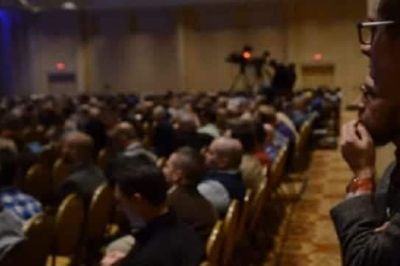As I walked from the Gaylord atrium to the convention hall, the conversations I couldn’t help but eavesdrop gave me pause. It was the second morning of the Southern Baptist Convention’s Ethics and Religious Liberty Commission’s (ERLC) national conference, “The Gospel, Homosexuality, and the Future of Marriage.”
Many attendees were downright giddy to hear ERLC’s new “game plan” for “regaining all the lost yards”—lost because of the bankruptcy of reparative therapy, the decisions of “activist judges,” and a shifting court of public opinion. Tuesday’s sessions would feature two “ex-gays-but-don’t-call-’em-that” Christians who exemplify the second part of this new “game plan.”
First to take the field was Rosario Butterfield, author of Secret Thoughts of an Unlucky Convert. Who better to “convict” us LGBT people than a former lesbian, feminist, tenured English professor and postmodernist who eventually found Christ after meeting a pastor of “an obscure, reformed denomination” and is now a different pastor’s wife and home-schooling mom?
The president of the ELRC opened by asking, “What do evangelical Christians just not get about the LGBT community?”
“One of the first things that I firmly believe you don’t get,” Butterfield replied, “is that in this very room, and in all of your encounters, you will meet and know and love people whose original sin has left the thumbprint of unwanted homosexual desire.”
Butterfield also told the audience they needed “to repent about all the gay jokes [they] have told and all the hardness of [their] hearts.” Why? Since God has set apart the chosen, even some in the LGBT community, those in attendance “are arrogant and theologically vapid when [they] believe [they] know who these people are.”
Now, this might sound progressive. But, in a later panel, Butterfield also stated, “If you start with sexual orientation as fixed, you condemn that person,” and that, “When we talk about chastity, we’re not talking about repression.”
And chastity brings us to the next speaker, Christopher Yuan, who coauthored Out of a Far Country with his mother.
Whereas Butterfield appealed to this audience as the former secularist academic turned believer, Yuan modeled his narrative on the Parable of the Prodigal Son. Yuan, a former Marine, had come out during dental school and cut himself from his family. Quickly, he progressed from using drugs recreationally to dealing them to other students (and even one professor), and he began having promiscuous sex. He was expelled three months shy of graduation for poor academic performance and his extra-curricular activities.
“Now, it’s important to know,” Yuan cautioned, “that not all gays and lesbians do drugs, [and not all are] promiscuous. Unfortunately, that’s part of my story.”
Though I appreciated the caveat, I can’t imagine it meant much to the “true believers” around me.
After the D.E.A. busted Yuan, he was “charged with the street-value equivalent of 9.1 tons of marijuana.” In prison, he found Christ after retrieving a Gideon’s New Testament from a trashcan. Two weeks after that, he learned he was HIV+.
For him, the dilemma was “either abandon God and pursue a gay relationship, by allowing my desire for [a] relationship to dictate how I lived. Or abandon pursuing a monogamous gay relationship by liberating myself from my desires and my sexuality, and live as a follower of Jesus.”
To “unpack” these narratives, LGBT persons who are “built” for marriage (and, Butterfield reminded the audience, not all are) must marry someone of the
opposite sex, or be asexual. So, this new “game plan” may sound familiar: simultaneously proclaim that LGBT identity and tolerance comprise a “Trojan Horse” for the persecution of a religious super-majority, while reducing our identities to pathological behaviors to be overcome.
A theme of the conference, ironically enough, was that we are all “born this way,” if “this way” refers to the stain of Original Sin. Or, to quote Butterfield, “People are not different. Original Sin is the great leveling playing field. It has democratized everything.” After a three-day conference about the supposed religious, legal, and cultural “threats” LGBT equality poses, however, I’d say the ground is anything but level.
